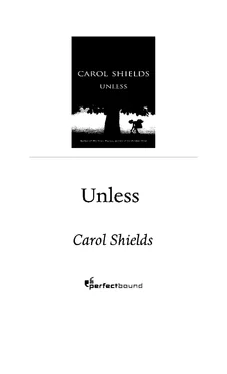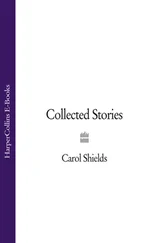Carol Shields - Unless
Здесь есть возможность читать онлайн «Carol Shields - Unless» — ознакомительный отрывок электронной книги совершенно бесплатно, а после прочтения отрывка купить полную версию. В некоторых случаях можно слушать аудио, скачать через торрент в формате fb2 и присутствует краткое содержание. Жанр: Современная проза, на английском языке. Описание произведения, (предисловие) а так же отзывы посетителей доступны на портале библиотеки ЛибКат.
- Название:Unless
- Автор:
- Жанр:
- Год:неизвестен
- ISBN:нет данных
- Рейтинг книги:4 / 5. Голосов: 1
-
Избранное:Добавить в избранное
- Отзывы:
-
Ваша оценка:
- 80
- 1
- 2
- 3
- 4
- 5
Unless: краткое содержание, описание и аннотация
Предлагаем к чтению аннотацию, описание, краткое содержание или предисловие (зависит от того, что написал сам автор книги «Unless»). Если вы не нашли необходимую информацию о книге — напишите в комментариях, мы постараемся отыскать её.
Unless — читать онлайн ознакомительный отрывок
Ниже представлен текст книги, разбитый по страницам. Система сохранения места последней прочитанной страницы, позволяет с удобством читать онлайн бесплатно книгу «Unless», без необходимости каждый раз заново искать на чём Вы остановились. Поставьте закладку, и сможете в любой момент перейти на страницу, на которой закончили чтение.
Интервал:
Закладка:
“She changed,” he said. “Over a few weeks. Late January, February, March. She was short-tempered. Then she’d go quiet. Her professor, Dr. Hamilton, she hated him for some reason. I asked her what the guy had done, if he’d come on to her or something, and she was furious that I’d think of a thing like that, that that was what would occur to me, something sexual. She started giving me these, you know, these long, hard looks. Scrutinizing looks.
Like she’d just suddenly realized what a dickhead I was or something. Then she left. One afternoon last week. I thought she was just going to Honest Ed’s, but she never came back.
Most of her stuff is still here. She’d stopped going to lectures by March, she just hung around the apartment reading or staring off into space. I would have phoned you after she left, but I thought she’d gone home, that she was with you. She was thinking about goodness and evil, about harm to the earth, that kind of thing. And then, it was just a couple of days ago, this girl I know said she saw Norah panhandling at Bathurst and Bloor, and I couldn’t believe it. I went and looked, and there she was with that sign, sitting on the sidewalk. I walked up to her and said, ‘What are you doing, Norah, what is this all about?’”
I watched him lean back into the torn couch cushions, and he started to sob unrestrainedly.
He howled so long and so eloquently that I will never forget it. Tears streamed down his face and he made no effort to brush them away. His hands were spread out uselessly on his denim thighs. I wanted to reach out and stroke his hand, but I couldn’t, I didn’t. I knew it wasn’t his fault, this poor young kid, but I felt myself harden. I felt the force of blame gathering. I just sat there and watched him cry. I felt my hopes flatten out and crush me with their weight.
Now I knew it was true. There wasn’t going to be anything I could do to save Norah from herself.
Following
How old is Alicia, the heroine of my novel? This matter is critical. She lives in the large city of Wychwood. She is an editor for a fashion magazine. She is engaged to be married to Roman, aged thirty-eight, and the wedding is just weeks away. This is her second marriage, and she has lived for short periods of time with two other men. I want her to remain grave and intelligent, yet still young enough to stir ardour. She is pert rather than perky, a wide-awake woman who already understands that the universe is supremely insufficient. She was thirty-four in the first novel two years ago, and so now I have assigned her the age of thirty-six.
Forty lies ahead, and she is well aware of forty — but not frightened by it. She spends perhaps too much money on top-quality skin products, even though she knows what scams the cosmetic industry brews up. There is something hermetic about her disposition, but she doesn’t really know this, not yet.
Does she speak her own story? In other words, is this to be a first-person narrative? Yes.
For one thing, My Thyme Is Up employed the first person, and a sequel must be consistent in such matters. Her voice is ironic and quizzing, loose-jointed but pulsingly intimate. She is not in the least ashamed that she is detached from large slices of popular culture. She might say
“shit,” if she stumbled and scraped her knee, but she would never, under any circumstances, describe some person or some essence as being “shitty.” That’s where her delicacy shows itself, in her vocabulary. Certain people might call this prissiness. She is mildly musical, plays the piano a little and once was reasonably accomplished on the flute. Her degree is in journalism, from Columbia. An A-minus average. (She could have done better if she’d loved men less.) She wears shawl-like garments, loose loping jackets, long dipping skirts, heavy silk, slim silver jewellery, clever earrings.
She cannot be stunningly beautiful and possessed of a perfect figure, and this was made clear in the first novel. The genre of “light” fiction rules out bodily perfection. We are not allowed to garland our men and women with exceptional good looks. Romance novels, on the other hand, are able to fill their pages with dozens of strikingly beautiful women, and literary novels can permit a single heroine a rare beauty, one only. Light fiction, being closer to real life, knows better. Some imperfection must intervene, and usually this is in the nature of a slightly too long nose or a smaller than average chin. It is not necessary to award such disadvantages as giant hips or mannish shoulders and certainly not one eye larger than the other, although breasts may be on the small size or else more generous than normal. A passing prettiness is what I claim for Alicia, conveyed without a lot of heavy detail.
Does she believe in God? No, despite her Presbyterian upbringing. God and his Son are metaphors, representing perhaps creation and renewal; this certainty arrived like a bullet-shaped slug of pewter when she was about twenty, sitting in a church pew with her parents, reciting the Nicene Creed. She almost never speaks of it, it is so unimportant in her life, the question of belief or disbelief — and she and Roman have not really touched on the subject.
There is a great deal they have not touched on, and this is beginning to worry her slightly.
Does she want children of her own? Yes, desperately. But vaguely. Does she see herself unbuttoning her blouse and offering her breast to a baby’s gaping mouth? Well, no, she hasn’t got that far in her thinking. A little girl would be lovely. Or a little boy. It didn’t matter a great deal. She supposes she would go on working for the magazine after a short time spent at home, six months or so. She has just begun a new monthly series on accessories and is now researching the history of women’s handbags. It is fascinating, really. It all began with the chatelaine of the medieval castle, the roving household manager needing something in which to carry her keys and her domestic accounts. It’s true you often see the Virgin Mary in paintings with a little sack purse on the floor next to her chair, but this is most likely an anachronism, as Alicia informed Roman yesterday while they were having dinner at Maurice’s, steak and frites and a good bottle of red wine.
“A what?” he said blankly. He hadn’t been listening to her. She gave him a long, severe look.
“Never mind,” she said crossly. Then she reached out and stroked his hand. Roman works as a symphony trombonist (note to myself: find out more about trombones); I was rather opaque about Roman’s vocation first time round, he sometimes complains that Alicia’s world of writing is narrow and inbred, forgetting that he and his fellow musicians form an exceedingly tight, self-referencing subgroup.
I too am aware of being in incestuous waters, a woman writer who is writing about a woman writer who is writing. I know perfectly well that I ought to be writing about dentists and bus drivers and manicurists and those folks who design the drainage beds for eight-lane highways. But no, I am focusing on the stirrings of the writerly impulse, or the “long littleness,” to use Frances Cornford’s phrase, of a life spent affixing small words to large, empty pages. We may pretend otherwise, but to many writers this is the richest territory we can imagine. There are novelists who go to the trouble of cloaking their heroes in loose crossover garments, turning them into painters or architects, but no one’s fooled. This matters, the remaking of an untenable world through the nib of a pen; it matters so much I can’t stop doing it.
Hardly
Not that I write with a pen. Nor do I know anyone else who does these days. But a little puff of romanticism still attaches to the idea of pen and ink, and testifies, falsely, to the writer’s essential independence and freedom. No one is quite ready to give up pen and paper’s metaphoric weight. I was thinking these thoughts when the kitchen telephone rang early on a November morning.
Читать дальшеИнтервал:
Закладка:
Похожие книги на «Unless»
Представляем Вашему вниманию похожие книги на «Unless» списком для выбора. Мы отобрали схожую по названию и смыслу литературу в надежде предоставить читателям больше вариантов отыскать новые, интересные, ещё непрочитанные произведения.
Обсуждение, отзывы о книге «Unless» и просто собственные мнения читателей. Оставьте ваши комментарии, напишите, что Вы думаете о произведении, его смысле или главных героях. Укажите что конкретно понравилось, а что нет, и почему Вы так считаете.












